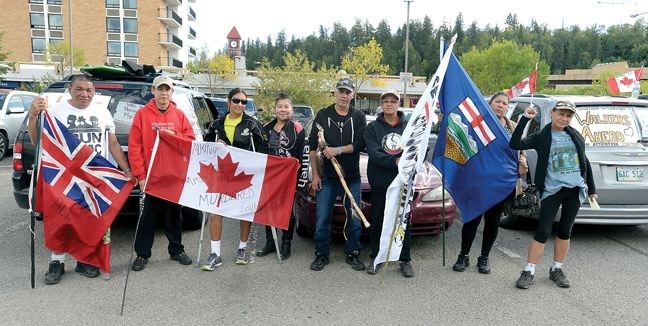A group of seven people walking from Winnipeg passed through Prince George Monday on a months-long trek to call for justice for murdered and missing indigenous people.
Their final stretch is along the Highway of Tears, with a last stop in Prince Rupert to finish the more than 3,400 kilometres they've traveled since mid-July.
"Every step on the ground is a prayer to our children, our families and the children that lost their mom or their dads. Those are the ones we focus on every day," said Brenda Osborne through tears.
Osborne, of Norway House, Manitoba, organized the walk in honour of her daughter Claudette Osborne-Tyo, who went missing in 2008.
Osborne talked of a broken system that unfairly treats aboriginal people, from justice, child services to interactions with police.
For Mary May Twayashing of Lake Manitoba, whose uncle was murdered, justice means "having the police work with the people, having them tell the families what's happening, if there is anything happening."
The opposite happened with Osborne's daughter.
"Nobody notified me. We heard it through the news," said Osborne, whose partner and brother are also on the trek.
Two fully loaded vans travel the distance too, packed full of gear and bearing the faces and names of the many missing.
"We've met a lot of people that have been touched by the murdered and missing," said Myrna Abraham, who works as a support worker in Winnipeg. "The number one thing is there's never an answer. They never solve it."
Abraham eventually got an answer from the RCMP, who found her sister Sharon Abraham's DNA on serial killer Robert Pickton's pig farm.
"He hasn't been charged for her murder, but yet they tell me that she's been his victim. Where's the justice in that?"
Abraham also objects to the way indigenous women are treated as victims.
"A lot of the women are labelled as a statistic, a prostitute, drug dealer, junkie, alcoholic. I know my sister was an alcoholic. They never talk about how much they were loved, that they had families that cared and cherished them."
Althea Guiboche agreed and said the media shares a role for how the missing and murdered are portrayed.
"We need to stop dehumanizing these women. They're blaming the victims," said Guiboche, who broke her ankle along the way and walks on crutches. "There's a lot of indifference towards the subject. People see it as more of an indigenous problem but Canada's a laughing stock."
For her, the walk was symbolic.
"I think it perfectly reflects our personal sacrifice, our dedication to creating awareness, our commitment to trying to get positive changes happening," Guiboche said. "This is Canada's problem. We need to address it as a nation."
Brenda Wilson John walked with the group for five kilometres just outside of Prince George on Saturday.
"It's a healing journey," she said, adding she's still going through that process after the loss of her sister Ramona Wilson in 1994, who went missing and was found in Smithers 10 months later, murdered.
So many faces of women have been added alongside her sister since Wilson John started working as the Highway of Tears coordinator for Carrier Sekani Family Services.
While the Manitoba group didn't make their trek about a national inquiry into missing and murdered aboriginal women, it's what Wilson John wants.
"We really need to work through the details of the justice system to really understand where we can make those changes. It's not only about the police, the RCMP," said Wilson John, adding those relationships are changing with the addition of aboriginal liaison officers and better training.
"In this province we've really worked hard to try to get that collaboration going," she said. "There's not a lot of trust between the communities and RCMP at this time, but they're working towards it."
To get there, Wilson John calls for more compassion.
"It's going to take a long time for things to change."



